- Home
- Jerry Spinelli
Dead Wednesday Page 10
Dead Wednesday Read online
Page 10
“TMI,” he says.
The bug begins to move, steps primly onto the cuff of his black shirt. He panics, shakes his arm. The spider falls to the ground.
She laughs, pats his head. “Such a brave Worm. Welcome to planet Earth, the world outside your head.”
••••• Touch •••••
She does a lot of that, touching. She’s forever kneeling, sniffing, feeling, running her fingertips over moss and tree bark—he never knew it came in so many colors—dislodging stones and delighting at the crawly stuff coming out. One time she foots over a rock and picks up a little lizard. It’s orange and black, about two inches long, slimy.
“Salamander,” she says. “Because they’re wet-looking, people used to think they could live in fire. So frying pans were called salamanders.” She holds out her hand. “Here.”
“No way,” he says. This time she listens. She puts the lizard back.
In the same hand she takes his. They walk, dodge trees, hand in hand. Out of nowhere she whirls and kisses him, on the lips. Backs off, grins. “Ever kiss a girl? Besides your mother? Don’t lie.”
“Not really,” he says. To anyone else he would lie.
She kisses him again, longer, harder, his cheeks cradled in her hands, which don’t seem to notice the bumps. He is thoughtless. When she finally pulls away, the front flap of his endless hat brim is standing up like a lifted tablecloth.
••••• Silence •••••
As he replays In the Woods in his head over the coming years, Worm will sometimes think it was all kisses and spiders and salamanders and feeling trees. But it wasn’t. It was mostly silence. Or more truly, talklessness.
Whenever she’s beside him, she holds his hand. Sometimes she interlaces her fingers with his. But it’s never long before she’s bolting to check out some new wonder:
“Fiddlehead fern!”
“Mayapples!”
They’re hidden under leaves. She eats one, hands one to him. He tries it. Crunchy. Good.
“Raspberries!”
“Sassafras!” She bolts, plucks up a plant, waves the root under his nose.
He can’t believe it. “Root beer.”
“Sassafras,” she says. “You can make your own root beer. See the leaf? Shaped like a mitten. That’s how you know.”
He has to ask: “What is it with you and all this nature stuff?”
She hugs his arm. “I just love it. I lived in a ticky-tack development. Springview Run. Has there ever been a more fake name?” She pirouettes. “This is where I wanted to live. I wanted to be you!”
And I want to live in town, he thinks. Or does he?
They return to the silence that is not silent. The silence that first tingled sweetly on his lips and now fills the forest. The silence that cannot contain this girl beside him, this girl that is a ghost that is a girl that is and was and that dances and dashes and laughs and fills him with now.
She jerks toward him, glares down at his wrist, his watch. “No!” she shouts, and tears the watch from his arm. She drops to her knees and scoops at the dirt till there’s a foot-deep hole. She drops the watch in and covers it up. She grabs his arm and catches his earlobe between her teeth and bites till it hurts, and they walk on in the silence that is louder than kettledrums.
••••• PJ’s •••••
It is during one of her mad bursts from him that he finally, after most of a day, connects two dots.
“You’re wearing pajamas,” he says.
She poses. “You noticed.”
“It was December twenty-fourth.”
She swoons. “I am in the presence of the world’s greatest memory.”
“It was cold.”
“Freezing.”
“Where’s your father’s coat you put on when you left the house?”
She wags a finger at him. “Ah…you caught me. I forgot to mention that our car has a fantastic heater, and it must have been on high and I was roasting in there, and I can’t figure out how to make the heat go lower, so I shrug off my father’s coat, which was of course a bad idea because I lost what little control I had of the car, and that’s when I went sliding down the hill into the snowbank.”
Two more dots: “So you’re sorry for that too.”
She jabs Wendy at him. “Bingo.”
“And the boots were in the car.”
“In the car. Waiting for me to execute my brilliant idea.”
••••• Brook •••••
The unsilent silence is marked by rustlings: their own footsteps, the rush of not-quite-seen animal things in the bushes. And now a new sound, a different kind of rustle.
“Water!” she cries, and sprints ahead. She’s out of sight in seconds, and he hears, “Yahoo!”
He finds and picks up first one raspberry fluffie and now the other, and now here she is, standing ankle-deep in a brook, stream, whatever, so skinny he can jump across it. He’s always heard it was out here somewhere, never bothered to look.
She’s cupping her hands and drinking and swishing her hands around, and she picks up a rock in the water and screeches, “Crayfish!” And now she’s on her knees, the water soaking all the way up her pj legs, and she’s clutching at the streamside mud with her fingers; her fingers are claws ripping into the earth and raking mud and water into her hair, and she’s pounding the mud and pounding the water, pounding and pounding with her fists and looking at him and crying as loud as a girl can cry: “Oh, Robbie—I was only seventeen!”
••••• “You Lied” •••••
He knows there is nothing he can say. If he was in a movie, he would probably squat in the water and pull her into his arms and stroke her muddy hair and go, “It’s OK…it’s OK….”
At least he squats. He watches her watching him. His tears join hers. He cannot remember the silence. The shadows of the trees and the setting sun make a lacework on the forest floor.
In time she pulls herself up. He helps her from the water. He finger-rakes the bigger clumps of mud from her hair. She stands with her head bowed, like a patient child, lets him slip her fluffies back on.
The anger—how long has it been here? At least since the long walk. Lying low, biding its time, letting sympathy carry the load. Not now. Suddenly it’s gorging him, demanding to be let out.
“You lied,” he says.
She stops, her head jerks back, shocked.
“Huh?”
He snatches the book from her hand. “You said the book changed your life. Gave you…permission.” He sneers the word. “You told me. You told Daisy Chimes. But you lied. You didn’t change. Not really.” He points in her face. “You’re a fake changer.”
She blinks, stares at him, her face streaked with mud. She’s looking down at him, as always, but somehow seems smaller now.
He wags the book in her face. “You know how I know? Huh? Y’know?”
She shakes her head.
He screams into her face. “Because you’re in that damn bottle. You got a couple more minutes here and then—bam—back to the bottle.”
She’s starting to cry. She lashes out at him. “Where I belong!”
He shoves her, so hard she lurches backward and falls on her butt. He straddles her. Yells. “See? That’s the point! You’re feeling sorrier for yourself than the whole cemetery of people at your funeral. Where you belong? Seriously? Even ghosts gotta chill, Finch.”
He walks away, turns back. It all wants to come out at once. “Yeah, sure, it was your fault. Who’s arguing? Your parents know it. Pooter knows it. The question is, where do you go from here? Unless you’re in love with bottles.”
He whips off the hat, plunks it on her head, pulls it down over her ears as she struggles to stand. “You’re smart. You’re funny. You taught me more in one afternoon than I learned in my
whole life. You’re still you, y’know, whatever you are. You’re still Rebecca Finch.” He thumps his chest. He sneers. “Permission? Screw Daisy Chimes. I’m giving you permission. Permission not to be pathetic. ‘Oh, boohoo. I can still smell those bugs I killed.’ Here she is, folks, our headline exhibit! Your once-in-a-lifetime chance to see…the amazing…the stupendous…MOPER IN A BOTTLE! Come one, come all! Seeing is believing! She mopes! She sulks! She pouts! She apologizes! For EVERYTHING! One measly quarter, that’s all it costs, folks! Take your time there, folks, don’t climb over each other! There’s no rush! She’s not going anywhere! Ever!”
She’s inches away, but he’s screaming again. Her face is still and flat, like a painting. He feels like slapping it. But doesn’t. Because as fast as it came, it’s gone now, the rage, like a summer squall. In times to come he will remember the raw feelings of the previous minute, not the words.
She hasn’t moved. Still she stands before him with the goofy hat over her ears. She’s stopped crying. She reaches up to the hat and pulls out the yellow feather and hands it to him and walks away.
But he’s not finished. There’s one more thing. His best shot. Then it will be over. She’s moved away, but he speaks as if she’s right beside him. He takes a breath. This was easier when he was screaming. “You used to be great, Becca Finch. Funny. Sweet. Lovable. Now you’re dead. Big deal. Get over it. Get a life. Get a death. Whatever. This is your forever you’re missing.”
She continues walking. Did she hear him?
Now she stops, in a cluster of mitteny sassafras. Her shoulders hunch, her hands go to her face. “Oh my God,” he hears. “I had it backward. It’s not about you. It never has been. I’m not here for you.” She turns to face him. “You’re here for me.”
A faint smile appears on her face, and he knows, yes, that is the truth of it. They stand simply, totally, looking at each other across the sassafras and ferns. Worm has been to church. He has a sense of the word sacred. There are no stained-glass windows here, only sweet roots and spiders and a river you can jump across, but he knows he is in no less a sacred place. He is inside a prayer.
Neither moves. This is the closest they will ever be again. “Becca—” he says, but is stayed by her raised finger. She removes the goofy hat and Frisbees it to him perfectly. He snatches it from the air. She blows him a kiss. He pretends to catch it and plants it on his nose. She laughs. She turns and walks. He knows she will not stop, so he must say it now and hope forever. He calls: “Becca…you were a girl in love! I forgive you! The fireflies forgive you! Forgive yourself!”
He watches as she walks through the trees and the pooling shadows until she is gone.
He begins to walk in that direction. Stops. No. There is no following her.
A flare of raspberry in a patch of mayapples. A slipper. Only one. He knows it was no accident. He runs the fluff against his cheek. Now they’ve each got one.
In time he turns to go home. The brook is playing a song he will forever associate with her. The sun has set. Night has begun.
The fireflies are out.
Worm knows it’s coming.
The second Eddie sits down beside him on the bus: “Where were you?”
Worm has thought about it. Obviously, he can’t tell him the truth. But lying has problems too. Eddie knows him so well, he’s hard to sneak a lie past. So he decides to go with vague and hope Eddie backs off. “I got sidetracked.”
Eddie looks like he’s never even heard the word. “Sidetracked? What’s that mean?”
Worm shrugs, tries to look no-big-dealish. “Other stuff to do. Fish to fry.”
“Fish to fry? What fish? What’re you talking about?” Apparently, Eddie isn’t big on metaphor. “Important enough fish to keep you from the fight? I kept looking for ya.”
“I wasn’t there.”
“Yeah, that’s the point. You weren’t there. Where…Hey”—he pokes Worm in the shoulder—“I heard you fainted in Language Arts. What’s that about?”
“I didn’t eat breakfast. Big mistake.”
“Girls faint,” says Eddie. “Guys don’t faint.”
“I guess I’m a girl, then,” says Worm. Eddie gives him a look like Worm’s a hard question on a test. Worm grabs the chance to shed the spotlight. “So how was the fight?” Worm really couldn’t care less, but he’s surprised there’s been no buzz about it on the bus.
Eddie snorts. “There was no fight.”
“Huh?”
“Everybody showed but Snake.”
“You’re kidding. All that buildup.”
“Cross my heart.” He crosses his heart.
Now that Worm thinks about it, when he saw Jeep in the hallway yesterday morning, he already looked ready to kill somebody. Snake? Worm never did see Snake. Maybe he never even showed up for school.
“Everybody was there,” says Eddie. “Even girls. Jeep was bonzo, challenging guys to fight. Nobody was dumb enough to step up. Then two girls—Patti Calucci and Joanne Hertz—started smacking each other—”
“Who?” says Worm.
“Patti Calucci and Joanne Hertz—until Patti ran home crying. So it wasn’t a total loss.”
There’s really only one school thing that interests Worm. If this was yesterday, he wouldn’t have the nerve to say it. But now it’s Becca’s voice in his ear: Be bold, Worm.
“So Bijou…,” he says. “Did you make your move?”
Eddie studies the passing scenery out the window. “Nah,” he says finally. “I decided to let her stew for a couple days. Build up the pressure. By the time I do it, she’ll be panting with her tongue hanging out.”
When Bijou boards the bus, her tongue seems to be pretty much in place. This time she doesn’t do her usual aisle walk. She stands the rest of the way. The bus driver lets her. She doesn’t turn. She doesn’t smile at anybody.
Before homeroom is over, the truth tidal-waves over the whole school. Eddie made his move, all right. And she said no. No!
Santa Claus. Dumped.
Easter Bunny. Dumped.
Eddie Fusco. Dumped.
What can you trust anymore?
* * *
—
Worm hardly slept last night. But he’s not tired. In fact, he’s wound up. But there’s nothing to do about it. Well, except for one thing, but that will have to wait till next week.
Meanwhile, as he moves from class to class through the school day, he scans for signs that someone else had an experience like his, that he’s not the only one. It’s not easy. What would such a sign look like? Haunted eyes? Dazed? It could be anything, really, different from the usual. (He wonders how he looks to others. So far nobody has said anything, unless you count Eddie on the bus.)
He inspects everyone. And everybody but one appears ordinary, disappointingly themselves. As if yesterday never happened. The sole exception is a shocker: Mean Monica Biddle. She’s created a minor sensation by wearing her black shirt again today. Everyone else has turned them in. (Those who didn’t trash theirs yesterday.) She wears it all day. She takes the mocking—there’s a lot of it—with a surprising smile. But even the mockers get the point: the Wrappers—no, scrap that word—the victims, their dead age-mates, deserve more than one day’s recognition, more than a hundred name cards and pictures tossed in trash cans and headed for the landfill.
Mean Monica complicates his feelings. On the one hand, he feels like saluting her for having the guts to do what nobody else would do. On the other hand, he can’t help wondering if and how her doing double black-shirt duty plays into the declaration on the bus that day over a year ago: “Get a life, Worm.”
Before then she was, well, a little more than just another girl. A member of the Bijou-Claire group. Boy haters until about sixth grade, except that with Monica and Worm there was an unexpected twist. She didn’t seem to hate him. On oc
casion she actually spoke to Worm. Usually just a “Hi,” but that’s all it took to make her stick out. She seemed to get a kick out of saying his name. She’d make her voice low and go, “Hello, Mr….Worrrrm.” (He got a kick out of that but of course didn’t show it, as he was a normal girl-hating boy.) Once, she made a big deal of stepping around him. “Don’t wanna squash you,” she said, and giggled. If he had to describe her in those grade school days, he might have said “funny.”
Like that, until about the time when all the other girls stopped ignoring boys—which was when Monica started ignoring him. And sometime later, for reasons still unknown, she made the bus declaration and hasn’t spoken to him since. (Well, except after the fainting thing yesterday.)
And now he’s got Becca Finch saying, “This is your life you’re missing.” And it annoys the crap out of him that Becca would say practically the same thing Mean Monica has been saying for over a year. And he wonders how two girls he feels so differently about can have the same view of him.
Monica’s black shirt seems to have no effect on Claire Meeson, who’s gabbing away with Monica as usual before Language Arts begins. And Monica must know that Claire, who’s nice to everybody, makes no exception of Worm, even speaks to and smiles at him. So how come Mean Monica hasn’t contaminated Claire with Worm hate?
Complicated.
* * *
—
At least twenty times during the day, Worm glances at his wrist, only to find that’s all there is: wrist, no watch. If Worm was a puppy out for a walk, time would be his leash, lashing him to the world. He keeps feeling not so much free as lost, forced to forfeit the prime parameter of his life and just…romp. But he’s never been a romper. Which may be, along with her own reasons, why Becca buried the watch.
Anyway, from last night until he left for school today, he had to fight the temptation to rush into the woods and dig it up. But he didn’t. He tries mightily to not look as often as he usually does at the classroom clocks. Hey, she changed (he thinks, hopes). Why can’t he?

 Who Put That Hair in My Toothbrush?
Who Put That Hair in My Toothbrush?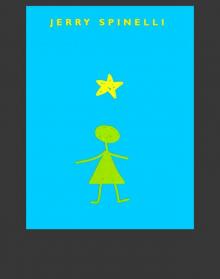 Stargirl
Stargirl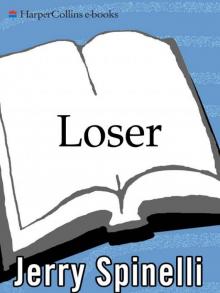 Loser
Loser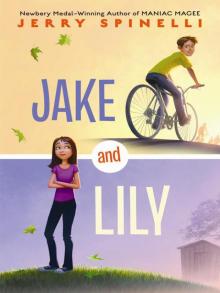 Jake and Lily
Jake and Lily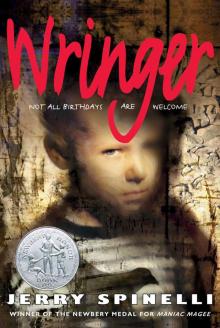 Wringer
Wringer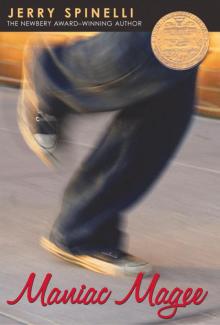 Maniac Magee
Maniac Magee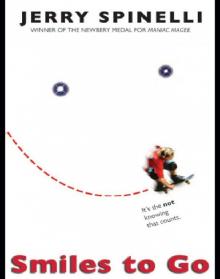 Smiles to Go
Smiles to Go Love, Stargirl
Love, Stargirl Hokey Pokey
Hokey Pokey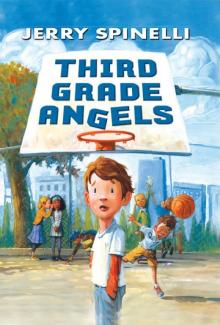 Third Grade Angels
Third Grade Angels Tooter Pepperday: A Tooter Tale
Tooter Pepperday: A Tooter Tale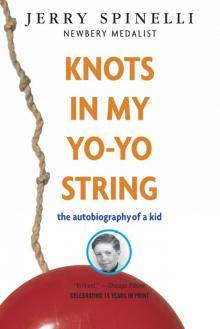 Knots in My Yo-Yo String Knots in My Yo-Yo String
Knots in My Yo-Yo String Knots in My Yo-Yo String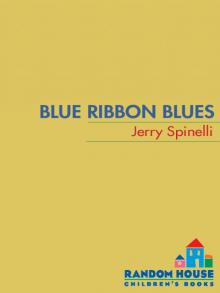 Blue Ribbon Blues: A Tooter Tale
Blue Ribbon Blues: A Tooter Tale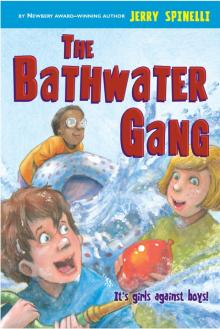 The Bathwater Gang
The Bathwater Gang Crash
Crash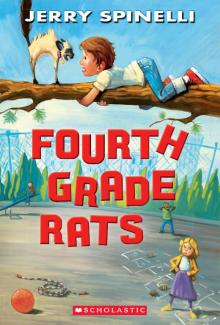 Fourth Grade Rats
Fourth Grade Rats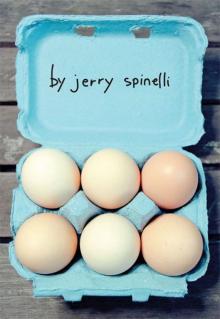 Eggs
Eggs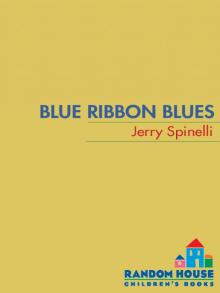 Blue Ribbon Blues
Blue Ribbon Blues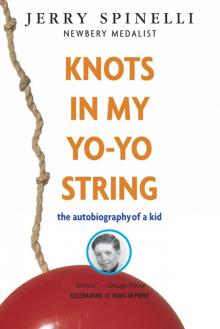 Knots in My Yo-Yo String
Knots in My Yo-Yo String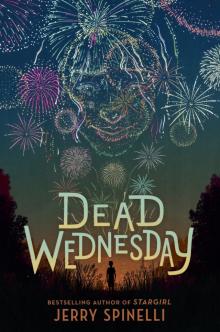 Dead Wednesday
Dead Wednesday Tooter Pepperday
Tooter Pepperday